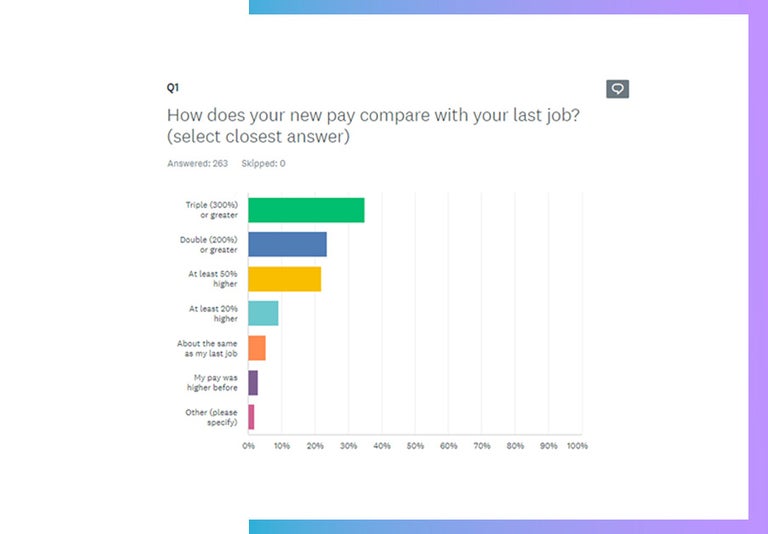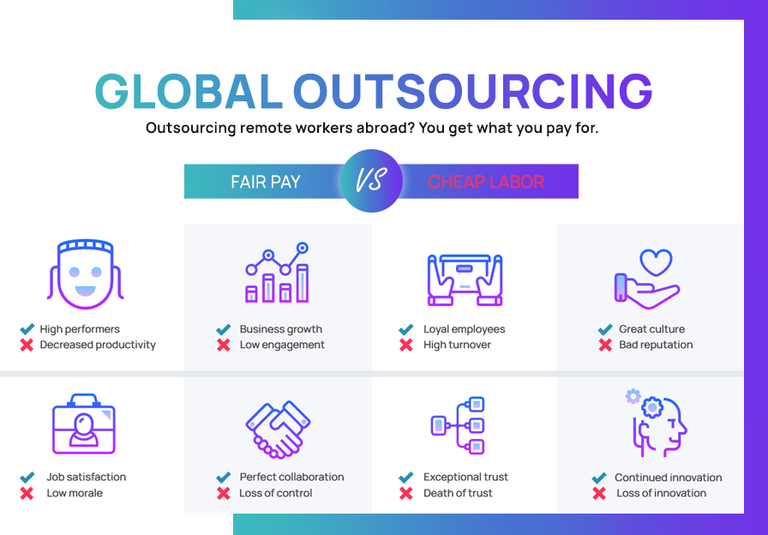Contents
- Cheap Labor: Not What You Ordered
- Mindset Matters: Tales from a Burger Joint
- The Globalization of Pay: What You Need to Know
- Doubling Down on Investment: The Power of Top Performers
- The Business Case for Fair Pay: It’s Not Just About Ethics
- The Future is Here: You Get What You Pay For
Remote work has made outsourcing a hot topic again. But too many companies repeat the same rookie mistake. If you're thinking about outsourcing cheap labor, read this before it's too late.
If you’re on the cusp of investing time, effort and resources into hiring remote workers abroad, with the intention of cost-cutting, hit the breaks for a second.
Cost-cutting is not a smart business strategy.
You’ve heard the saying: you get what you pay for.
It's true whether you're buying a hamburger, knockoff designer goods, or a car: the cheapest option is probably not the best one.
And yet, a lot of people do choose the cheapest option... often regretting it later. It leads to an endlessly hilarious list of "what I ordered vs. what I got" fails.

The big mistake is believing that:
COST = VALUE
And that's because cost is only one factor in value. The other one is quality.
VALUE = QUALITY ÷ COST
Let that sink in.
You already know it's true. While you can shrug off a cheap purchase that turns out to be low quality, you probably don't take that risk when you're buying a car.
Because it's an important decision, you instinctively prioritize value, not cost.
⚡ So why do so many companies do the opposite when it comes to people? ⚡
In this post, I’m going to walk you through why you should pay your overseas remote workers well, not look for the cheapest labor you can find. Sure, cheap talent makes flashy promises.
But could your company invest in the service version of ‘what you ordered vs what you got,’ and succeed?
Lumpy code is much harder to return than an ill-fitting prom suit.
Cheap Labor: Not What You Ordered
Does lower cost talent equal higher profit for your company?
Sometimes, yes.
Now that remote work has proven software developers can work from anywhere, it’s tempting to go all-in on a global outsourcing model that focuses on cost cutting.
Tech companies everywhere are searching for solutions like these to reign in the overspending that happened during the pandemic.
Short term gains from nipping and tucking payroll is an attractive idea. Why not outsource an expensive local software department overseas for pennies on the dollar?
It’s a rookie mistake.
People aren’t the same as products. And unskilled workers don’t operate the same as highly skilled people do. The longer-term implications of trying to apply this outsourcing strategy will be catastrophic for your company.
- Decreased productivity: According to the International Labor Office, studies indicate that pay is directly related to productivity. When you underpay people, they do the least.
- Low engagement: According to Gallup, pay influences employee engagement. A poorly paid employee is a disengaged employee, who puts time but not energy into work.
- High turnover: Workers who are paid pittance quickly leave for better opportunities. This high turnover means inconsistent work, unreliable providers, and an ongoing onboarding process that costs a fortune and never settles into a functional system.
- Damaging your company reputation: When your in-house teams know that you’re outsourcing and exploiting international workers, it harms company culture. And worse, it clearly states to everyone that profit is more important than people.
- Low morale: The Living Wage Foundation says that low pay contributes to poor mental health. People who aren’t paid correctly are more depressed, anxious and unmotivated.
- Loss of control: Poorly paid outsourced workers are not going to go the extra mile to uphold your brand values, standards and processes. Gitlab says quality, schedules and opportunistic behavior may result (like subcontracting to a fourth party).
- The death of trust: When you pay someone poorly, you’re telling them how much you value them. In this case, not much. It immediately and irreparably kills trust and causes resentment in the working relationship.
- Loss of innovation: Innovation happens when employees are engaged, excited and looking for ways to improve – none of which happens if they feel like it’s not worth their time.

This is what happens when you hire remote talent overseas, and pay them less than they’re worth.
Short-term savings will be eclipsed by long-term costs.
Perhaps the most critical consequence is loss of quality. Your people are the heart of your business and the source of your competitive advantage.
So how you approach hiring remotely is key.
Mindset Matters: Tales from a Burger Joint
Would you rather eat at the cheapest restaurant or the best one?
A hot new burger joint opens in town. Soon after that, the local papers quickly crown them ‘best burger in the city.’
They have the freshest local ingredients, cooked by the most talented staff. The owner is delighted, but those ingredients are pricy. He has two options:
- Path one: the owner knows he’s struck the recipe for success! To keep the best burger in town title, he doubles down and fixates on the important ingredients that make burgers amazing.
- Path two: like any business owner, he wants to increase revenue. He decides to increase his margins by swapping out some of the pricier ingredients for cheaper alternatives.
Both paths are optimization paths, but the mindset couldn't be more different.
In the short term, path two will probably look better. Business is still booming, and a lot of people won't notice the slight drop in quality, and the owner makes a fatter profit. Win/win, right?

But in the long run... you can probably guess what would happen if the owners chooses path two. Inevitably, the reduction in quality will have an effect. Word of mouth sours, and loyal fans move on because he no longer has the best burgers in town. His restaurant has become just another burger joint.
To win customers back, he has to start running discounts and promotions... chewing away the margin once again.
Long-term, the revenue opportunity of path one is much higher.
So, why does this matter for recruitment?
Richard Branson said it best: "When it comes to business success, it is all about people, people, people"
People are the most important investment any company makes.
People are the heart of a business. The core of competitive advantage. The key to winning or losing.
Nothing matters more than people.
And yet, a lot of CEOs repeat the same rookie mistake. They see hiring remote workers as an opportunity to outsource cheaper labor.
Ethical reasons aside, just because someone overseas is willing to work for cents on the dollar, doesn't make it a smart strategy to hire that person.
Learn from the memes: low cost ≠ good value.
Most of the time, the cheapest burger tastes like socks. The cheapest knockoff designer goods don't fool anyone. The cheapest car is a lemon.
They're bad value.
And so is the cheapest remote worker.
You get what you pay for.
Hiring the best person you can afford is a much savvier business decision than hiring the cheapest person who can do the job.
The big question is: How do you want to optimize your remote work model?
- Path one: tap into the global pool of high quality talent. Hire the most valuable person you can afford.
- Path two: cut costs by hiring the cheapest person who can sort-of do the job.
But cheap labor comes at a high cost. The cost is QUALITY, which risks killing productivity, innovation, and competitive advantage.
Don’t be blinded by the flashy promise of cost-savings upfront. What you order and what you get are two completely different things.
That's why smart companies don't seek to decrease costs. They seek to increase value.
On the global talent market, this difference is subtle but powerful.
And furthermore, the "cheap labor overseas" outsourcing model won't be viable for much longer. It may have worked for call centers in the 90s, but it's about to go extinct.
Here’s why.
The Globalization of Pay: What You Need to Know
Remember when DVDs were locked into a local market because of zone restrictions?
They were expensive in one country, and super cheap in another. Same product, different market. Then the restrictions fell away, and streaming services took over.
Now DVDs are a standard price determined by quality, not region.
Globalization has an equalizing, standardizing impact.
That is exactly what is happening with remote work. The truly talented remote workers in India, the Philippines and Africa were locked into local markets with limited options.
But now, the market has opened – and with more companies hiring internationally, they are no longer forced to accept low pay. If the only reason your developers or accountants worked for you is because they didn’t have access to better opportunities... they do now.
Payscales are globalizing. It’s already happening.
Top c-suite executives have been able to command top-dollar for years, as international companies compete for their attention.
And the rise of remote jobs means the best workers in many fields can already get paid what they're worth on the global market—regardless of location.
What happens next is the basic laws of supply and demand.
Outsourcing cheap labor was only viable when job markets were local economies. A great accountant in Manhattan would earn $50,000 month while a great accountant in Manila earned $500. So, you could pay $501 and find someone great.
Because the economy was closed, even highly talented people had no better option.
But that's not true anymore. As global opportunities rise, a great accountant in Manila can now command 10X the local median.
When the best people have better options, a reduction in the quality of the remaining talent pool is inevitable.
This won't stop companies trying to underpay overseas labor.
But it will stop them from finding someone good.
And that's an own-goal of colossal proportions.

Scraping the bottom of the metaphorical talent barrel just to save money is incredibly short-sighted.
A high quality worker may cost 2X more than a low quality one.
But if they also deliver 5X better results for your business, they are better value. Choosing the cheaper option would take a torch to your competitive advantage.
If you ONLY see remote work as an outsourcing option, you’re setting yourself up to fail. Soon, what you order vs what you get will be laughably different.
We know this, because at Crossover we’re doing everything in our power to ride the wave of globalizing pay. It's not only better for the worker, it's better for business.
Here's how we do it:
- We set the pay before we find the person
It's not as hard as it sounds. Simply assign the pay based on the value of the work. Then find the best person for the job. Setting the pay before we know who will get the job is a leap of faith. But the global talent pool is full of incredible skilled workers. Our model enables us to attract the cream of the crop. It's a win/win because we get the best person in the world, and they get paid what they're worth.
- We advertise the pay upfront.
Money talks. The fastest way to attract the best people in the world is to publicly offer the going rate for the best person in the world. Furthermore, New York State now requires pay to be disclosed in job ads, and a growing number of countries and states are moving in that direction. We got in first, and it set us up to win the war for the best global talent while everyone else was still battling over the best people in California.
- Our mindset is "it's hard but it's worth it".
We set incredibly high standards. It's hard to qualify for a role on Crossover, and it's even harder to succeed. World-class skills aren't enough; we also expect unwavering productivity, and hard-hitting KPIs.
But we make it worth their while by paying their global value of their skills, regardless of where they live.
The best people in the world are here waiting for you.
- We have a completely flat pay structure.
There are downsides to a flat pay structure: no bonus, no annual raise, no cost-of-living increase.
But those are outweighed by the upsides: equality and transparency. Pay discrimination becomes near-impossible. There is no gap between men and women. No new hires getting offered more than experienced workers. No room for a biased middle-manager to dish out unfair bonuses or raises.
The result is powerful:
- 59% of our hires said their pay was 200-300% MORE than their previous job
- 80% of our hires said that the pay was much higher than roles in their own city
- 80% of our hires said pay influenced their decision to take the job

Crossover and companies like ours, attract the best remote workers because we prioritize VALUE, not cost.
While we could shortchange talent, our decision to pay people what they're worth ensures long-term success.
Having the best people in the world on your team is an unbeatable business advantage. Having the cheapest people in the world is not.
Doubling Down on Investment: The Power of Top Performers
So how do you want to handle your company’s future with remote work?
If you’re an investor then you know when something works, you double down on it.
This isn’t just true of investing, it’s a business principle made famous in a multitude of popular business books, like the 80/20 Principle.
This principle says that 80% of your outputs come from 20% of your causes. It’s finding and optimizing those inputs that matters.
In this case, 80% of your business growth will come from the efforts of 20% of your people. Once you find that high performance lever, you put everything you’ve got into them. That’s good business.
If you have stock going bananas on Robinhood, you don’t cash out, you buy more.

Top performers do that for a company. If you pay them what they’re worth, they will take your business to unimaginable heights.
- Top performers are performance-orientated and care about value
- They increase the performance of team members by 15%
- Experts say that 10% of productivity comes from the top 1% of employees
The Business Case for Fair Pay: It’s Not Just About Ethics
A lot of people see remote work as an outsourcing option. It’s a rookie mistake!
The truth is that it goes way beyond that. There is a serious business case for paying contract remote workers what they’re worth. Let’s put aside the obvious joy that comes from fairness.
The fact is that anyone should be able to get fair pay for their work. Especially previously disadvantaged folks, minorities and those often sidelined because they don’t meet a standard median idea of what success looks like.
Let’s put aside all of that, and focus on business outcomes.
- High performers: Are significantly more productive, outperforming the average worker while making the most impact on your company. Higher pay, means higher productivity.
- Business growth: Workers with fair pay are more motivated, creative and ready to problem solve which is great news if business growth is on your mind.
- Loyal employees: Retention improves when people have what they need to thrive. The value of a job that pays fairly is extremely high.
- Rock solid culture: Fair pay means everyone performs better, and no discrimination means a stronger culture across borders. One Harvard study even proved women perform better than men when financially incentivized, so the gender pay gap makes zero sense.
- High workplace satisfaction: Studies have shown that when a person is paid well they are happier, which is a result of higher job satisfaction.
- Perfect asynchronous collaboration: Well-paid remote workers are better at collaboration, which improves teamwork, reliability and performance.
- Exceptional reliability and trust: Autonomy and trust are easier to establish when you show your remote employee how much you value their work.
- Continued innovation: A well-compensated remote worker will always be on the lookout for new ideas, tests, collaborations and improvements for your company.

These are the long-term benefits you gain when you pay your remote contract workers well.
They’re the competitive advantage that will help your company CRUSH the 80% of others hyper-focused on pinching pennies overseas for short-term gains.
Only one decision remains.
The Future is Here: You Get What You Pay For
When you go all-in on this remote strategy, there’s no limit to how high you can climb.
Future-proofing your global workforce against the globalization of pay is a smart strategy that will start working for you right away.
But you need to ditch the idea that cheap labor overseas is going to be a thing. It isn’t and good riddance. Exploitation is not a good look for your brand.
As Marc Benioff of Salesforce once said, “Acquiring the right talent is the most important key to growth. Hiring was – and still is – the most important thing we do.”
Your people matter, no matter where they live.
We’re canceling the global outsourcing of cheap, highly skilled talent. Instead let’s pay the best people what they deserve for being the BEST in the WORLD.
Leaping across borders means you’re looking to play in the big leagues. So, stop thinking like a rookie. Don’t order flashy dreams, only to receive laughable quality in return.
If the ‘what you ordered vs what you got’ memes have taught us anything, it’s that a lot of people will waste a lot of money doing the wrong thing.
Imagine how much you could make if you doubled down on top performers instead?
The world would be your oyster burger.
Remember: You get what you pay for!
Bite into a world of top performers >> Hire with us








